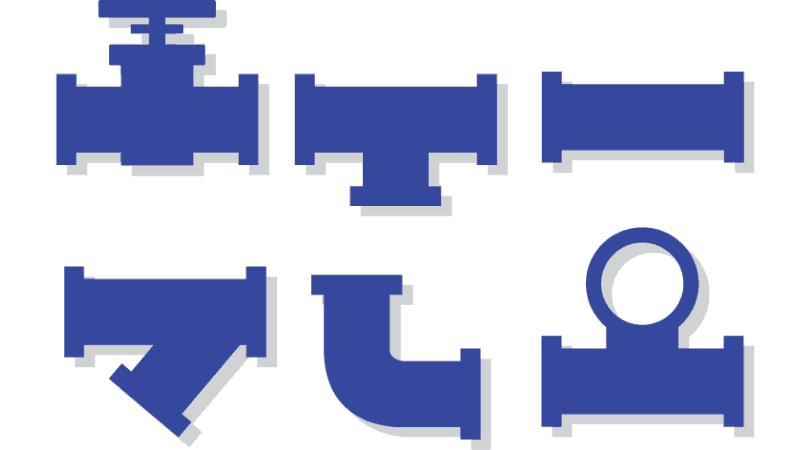The world of piping engineering is vast and ever-evolving, with new technologies and techniques always emerging. As a result, aspiring piping engineers and designers must stay up-to-date with the latest trends and developments.
One of the best ways to do this is by enrolling in an online piping training course.
How to be an Expert in Piping Components for Oil & Gas Career

What You Will Learn in This Online Piping Training Course
- Types of Pipe Fittings Used in Piping.
- Applicable Code, Standards, and Specification
- Inspection and Testing of Fittings
- Special Piping Components
- Different types of materials
- Manufacturing methods
- Heat treatment requirements and methods
- Visual, Dimensional & Marking Inspection
What You Will Get in This Course

What is Covered in This Course
Piping components are basic building blocks of Oil & Gas Industries.
The oil and Gas industries have become very competitive at the current time. Getting the right mentor and the right exposure within the industry is difficult during the growth phase of your career.
With a limited training budget spent by the company on employee training, it is even more difficult to acquire the knowledge to succeed.
This piping components training course is designed based on years of field experience to ensure that you know every aspect of the piping components you will expose in the field. Once you are in, you can access this course for a lifetime.
A real-life industrial course on Piping Components is used in the Oil & Gas industries.
- Different types of Pipe, Pipe fittings (Elbow, Tee, Reducers, Caps, etc.), Flanges, Gaskets, Branch Connections (Olets), Bolting materials
- Special piping components such as valve, long neck flange, steam traps, orifice flange, spacer & spade, spectacle blind, expansion joints, strainer, etc.
- Materials (Metal-Carbon Steel, Stainless Steel, Alloy Steel, etc., Non-Metal- PVC/CPVC, HDPE, GRE-GRP, etc.)
- Manufacturing methods
- Heat treatment requirements and methods
- Inspection and Testing requirements (Non-destructive Testing, Mechanical & Chemical testing)
- Visual, Dimensional & Marking Inspection requirements
- Code, Standards & Specifications used in piping
What will you learn in 3.5 Hours of Content, 64 lectures & 8 Quizzes?
The piping training course starts with essential topics of piping components and moves toward the advanced concept. The initial sections cover piping fundamentals and the piping components’ role in piping.
You will also get acquainted with industrial code, Standards, and Specifications. Equipped with this knowledge, you are ready to learn about different types of piping components.
Core sections of the course cover all the main types of piping components used in any process plant piping. You will learn about individual types of piping components, different types within that category, and their specialty in detail. Pipe, Pipe Fittings, Flanges, branch connection, Gasket, and Bolting materials.
You will also learn about special piping components such as long neck flanges, orifice flanges, Spacer & Spade, Spectacle blinds, Strainer, Expansion Joints, Steam Traps, and lots of other components.
Detail sections on types of material, material selection, and manufacturing process will fine-tune your knowledge of piping components.
In Quality Control and Inspection sections, you will learn about heat treatment requirements, hydro tests, destructive testing, non-destructive testing, and visual, dimensional, and marking inspection requirements for individual piping components. You will also learn which standard to use for testing and many other details.
At the end of this piping training course, your skill and knowledge will make you confident that you can give the lecture on the piping components at your workplace and go for inspection and testing at the piping components manufacturer location even if you have not seen these piping components earlier.
Course Content List
Section-1 Course Road Map
- What you will learn in this course?
Section-2 Code, Standard, and Specification
- What is Standard?
- What is Code and Specification?
- System Design Code and Material Standard
- Dimension Standard and use of code, standard, and specification in piping.
- List of Code & Standards
- Quiz -1
Section-3 Process Piping Foundation
- Process Piping Foundation
- Points to remember from this section
Section-4 Piping Components
- Pipe Essentials -1
- Pipe Essentials -2
- What are Pipe fittings?
- Elbow, Reducing Elbow, Miter Bend, and Returns
- Tee, Cross, Reducer, Cap, and Stub end
- Union, Coupling, and Swage
- Essentials of Pipe Flange
- Threaded, Socket weld, and Slip-on Flanges
- Lap, Weld Neck, and Blind Flanges
- Branch Connection – Olets (Weldolet, Sockolet, Thredolet, etc.)
- Essentials of Pipe Gaskets
- Non-Metallic and Metal Gaskets
- Spiral Wound Gasket, Metal Jacketed Gasket, and Kamm/ Cam Profile Gasket
- Bolting Materials – Stud, Bolt, Nuts, and Washers
- Quiz -2
Section-5 Special Piping Components
- Valves
- Long Neck Flanges & Orifice Flanges
- Spectacle Blind, Spacer & Spade
- Strainers
- Expansion Joints & Flexible Joints
- Steam Traps
- Scrapper Tee & Long Radius Bends
- Insulation Gasket Kit
- Quiz-3
Section-6 Material Selection and Different Types of Material Used in Process Piping.
- Essentials of Piping Materials
- Killed Steel vs. Rimmed Steel
- Ferrous Materials
- Alloy Steel
- Role of Alloying Elements in Steel
- Stainless Steel
- Non-Ferrous Materials
- Non-Metallic Materials
- Lined and clad Materials
- Quiz-4
Section-7 ASTM Material Grades for Pipe Components
- ASTM Material Grades for Pipe
- ASTM Material Grades for Wrought Fittings
- ASTM Material Grades for Forgings
- ASTM Material Grades for Gaskets
- ASTM Material Grades for Bolting
- Quiz-5
Section-8 Manufacturing of Piping Components
- Seamless Pipe Manufacturing – Plug Rolling Mill
- Seamless Pipe Manufacturing – Mandrel Mill, Extrusion, and Forging Methods
- Welded Pipe Manufacturing – ERW/HFW/EFW
- Welded Pipe Manufacturing – SAW
- Elbow Manufacturing Methods
- TEE Manufacturing Methods
- Reducer, Cap, and Stub End Manufacturing Methods
- Forge fittings, Flange & Olets Manufacturing Methods
- Gasket Manufacturing Methods
- Stud, Bolt, and Nuts Manufacturing Methods
- Quiz-6
Section-9 Heat Treatments of Pipe Components
- Heat Treatment Methods
- Heat Treatment Requirements
- Quiz-7
Section-10 Non-destructive and Destructive Testing
- Non-destructive Testing and Destructive Testing
- Hydro Testing and Proof Testing (Type Testing)
Section-11 Inspection of Piping Components
- Visual Inspection
- Dimensions Inspection – Pipe and Pipe Fittings
- Dimensions Inspection – Flanges and Olets
- Dimensions Inspection – Gasket and Bolting Material
Section-12 Marking of Piping Components
- Marking Requirements for Flanges and Olets
- Marking Requirements for Pipe and Pipe Fittings
- Marking Requirements for Spiral Wound Gasket and Bolting Marking
- Quiz-8
Trusted by Engineers
Trusted by Engineers across the globe, more than 9,500 students enrolled as of 30th Jun 2021.
Grow Your Career
You will earn the experience that will help you to fast pace your career and makes you confident in the workplace.
Save Money
Save time and money as compared to offline courses. No travel, no leave from office. Learn at your convenience.
100% Money Back Guarantee
30 Days No question asked 100% money-back guarantee
Lifetime Access
You will get lifetime access to the courses. Watch course videos as many times as you want.
Certificate of Completion
Get the course completion certificate to show your achievement.
FAQ
Q: What does your 30-day refund guarantee entail?
A: Our 30-day refund guarantee means that if you’re not satisfied with the course within 30 days of purchase, you can request a full refund. No questions asked!
Q: Do I receive a course completion certificate?
A: Yes, upon completion of the course, you will receive a course completion certificate that you can use to showcase your newly acquired skills and knowledge to potential employers or clients. You can download the same from your course dashboard.
Q: How do I access the course content?
A: Once you purchase the course, you will be given access to the course content. You can access the course from any device with an internet connection using your login ID and Password.
Q: How long do I have access to the course content?
A: You will have access to the course content for as long as you wish. You can take as long as you need to complete the course.
Q: What if I have questions or need help with the course?
A: We offer email support to all our students. If you have any questions or need help with the course, email us, and we’ll get back to you as soon as possible.
Q: Is the course self-paced or do I have to follow a set schedule?
A: Our course is self-paced, which means you can complete the course on your own schedule. You can take as long as you need to complete the course.
Q: What kind of payment options do you accept?
A: We accept all major credit cards and PayPal. And for Indian users, we accept UPI, Net Banking, Debit Card, and all the Indian Payment Systems available.
Q: Is there a limit to the number of times I can access the course content?
A: No, there is no limit to the number of times you can access the course content. You can revisit the content as many times as you like.
Q: Do you offer any additional resources or materials to supplement the course content?
A: Yes, we provide additional resources and materials to supplement the course content. These resources may include course presentations and additional study resources.


